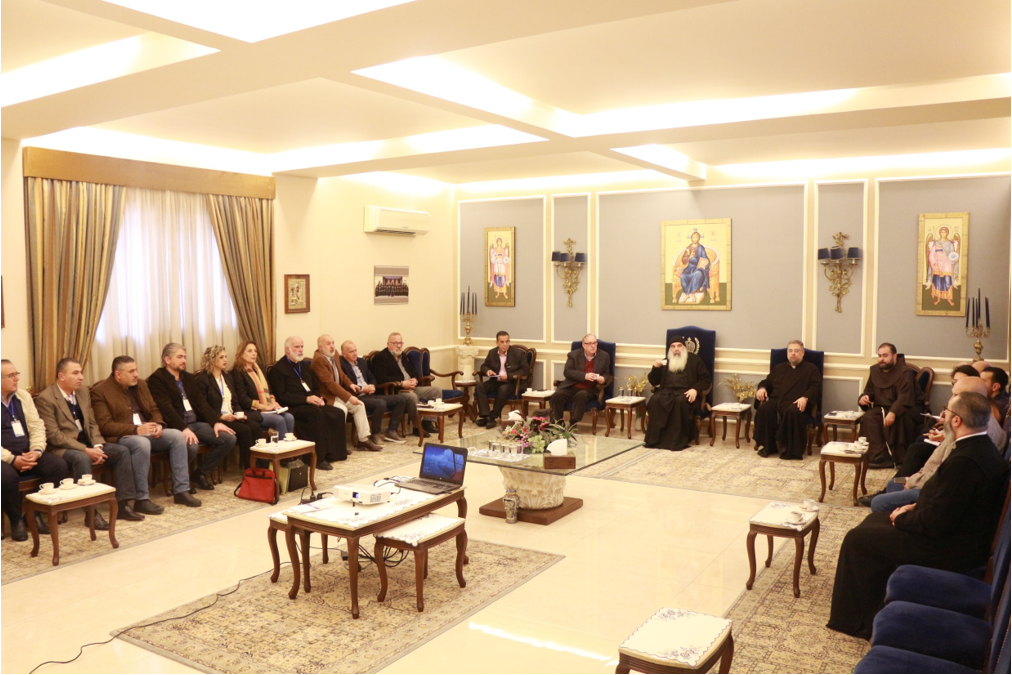The Middle East Council of Churches Continues Its Ecumenical Work for the Relief of the Affected People by the Earthquake
As part of its endeavor to support the affected people of the city of Lattakia and with the aim to alleviate the repercussions of the earthquake disaster, the Middle East Council of Churches’ team, Service and Relief – Diakonia Department, visited the Greek Orthodox Archdiocese of Lattakia. The team met His Eminence Metropolitan Athanasisos Fahed, Metropolitan of Lattakia and Dependencies, as well as representatives of Churches and members of the "Follow-up and Coordination" Committee in the Archdiocese, in order to discuss how to provide support and assistance to the people and mitigate the effects of the earthquake.
The MECC delegation included the Director of the Service and Relief – Diakonia Department Eng. Samer Laham, Eng. Nemer Haddad, Eng. Ibrahim Dib, and Lama Halaweh.
The meeting began with a speech delivered by His Eminence Metropolitan Athanasisos Fahed, in which he welcomed the attendees, and explained that the Archdiocese supported its people since the first day of the devastating earthquake. He added that the Archdiocese formed a committee with the various Churches in Lattakia to coordinate together and follow up on the situations of the affected people, as well as to provide them assistance and help them restore their homes.
He said, "The city of Lattakia was forgotten throughout the years of war, and did not receive aid as the other Syrian provinces, despite being affected by the war. Today, the city is also forgotten after the earthquake disaster." He stressed that the Archdiocese is ready to cooperate with donor agencies and parties that will work to mitigate the repercussions of this disaster on the people of Lattakia and its countryside.
Then, the Middle East Council of Churches’ team presented an explanation of its service and relief work aiming at helping the most vulnerable groups affected by the Syrian war and the earthquake catastrophe that struck Aleppo, Lattakia and the North of the Antiochian Levant, on the 6th of last February.
Since the earthquake disaster, MECC has collaborated with its partners in order to obtain the necessary support and respond to the affected people’s needs. Hence, the MECC team visited Lattakia to know closely these needs, which have varied since the beginning of the disaster. Noting that the Middle East Council of Churches works to enhance joint action between Churches under the guidance of His Beatitude Patriarch John X, Greek Orthodox Patriarch of Antioch and All the East, with his management as MECC President and Shepherd.
The MECC team also emphasized the necessity of coordination between all Churches for the relief work to avoid gaps in response and financing. The Council is currently seeking to secure the necessary support in order to implement a program for the restoration of damaged houses by the earthquake, according to the extent of damage in these homes, which is indicated by the engineering reports.
Since people from all Church Families were affected by the damage caused by the earthquake, joint action, with one hand, is necessary, as well as unifying the beneficiaries' data with the local MECC partners to prevent duplication in the beneficiaries' access to the services provided by the Churches. This is in addition to unifying the workflow between all Churches.
Then, the Middle East Council of Churches’ team listened to the explanation of the “Follow-up and Coordination Committee” which is working to follow-up the conditions of the affected people by the earthquake. The explanation was centered around the Committee’s work that has been done since the earthquake occurred until today. It was presented by Eng. Madonna Bechara, member of the “Meli” Council in the Archdiocese, and member of the Follow-up Committee as a supervisor of the engineering committees that are doing the engineering surveys of the affected homes.
This presentation highlighted the Committee’s work in registering the cases of the affected people by the earthquake and providing them quick assistance, as well as preparing integrated data on those affected to be presented to donors through the Archdiocese. This work aims at contributing to the consolidation and restoration of cracked buildings by the earthquake. The presentation also showed the work’s methodology of the “Follow-up and Coordination Committee”, and the total number of affected families that have been assisted since the earthquake occurred.
From his end, Father Meletius Msika, a Priest in the Lattakia Archdiocese and Secretary of the Council of Pastors of Christian Churches in Lattakia, praised the MECC role and its importance, especially in “strengthening the Christian presence in the East”, adding that “this is the Council’s message, and objective of the Church relief and field work.”
He said, "The goal of the joint Ecumenical work is to let every Christian in this country feels that God's hand is the Church’s hand which extends to present help and support during crises, wars and disasters. Through this work, the Church can make all its efforts to emphasize that God is present and to stress that it bears the Cross and also the pain of its people. Hence, MECC have an important role, especially in brining all Churches’ efforts together to show the compassionate face of God in this country.”
Father Msika added, "We have formed a Follow-up and Coordination Committee so that we can strengthen our Church presence on the field, for the Church to sorrow love in these harsh conditions, and for the people to know that the Church feels their pain, anxiety, and needs. We also invited the Churches’ Pastors to the Archdiocese, on February 14, to form this Committee and unify their vision firstly, work secondly, and efforts thirdly.”

